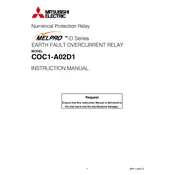Mitsubishi COC1-A02D1 Instruction Manual


The Mitsubishi COC1-A02D1 Relay is a three-phase solid-state relay designed for industrial applications. It generally features a rated operational voltage of AC 24-240V and a control input voltage of DC 4-32V.
Ensure the relay is mounted on a proper heat sink to manage thermal dissipation. Secure the relay with screws to prevent vibration and use appropriate terminal connections to avoid loose contacts.
Check the control input voltage and ensure it is within specifications. Verify all wiring connections, and check for any signs of damage or overheating in the relay.
Regularly inspect the relay for signs of wear, overheating, or damage. Clean the relay surface and terminals to prevent dust accumulation. Ensure that the relay is operating within specified environmental conditions.
Use a multimeter to check for continuity across the output terminals when the relay is activated. Ensure the control input is supplying the correct voltage and observe the relay's response.
The relay is designed to operate in environments with temperatures typically ranging from -30°C to 80°C. Ensure proper heat management to avoid exceeding these limits.
Symptoms may include failure to switch, erratic operation, excessive heat generation, or visible damage on the relay's casing.
Ensure the new relay matches the voltage and current specifications of the old one. Verify compatibility with the control system and check the installation for any potential issues.
Use an appropriate heat sink and ensure adequate ventilation around the relay. Avoid exceeding the current rating and periodically check the relay for signs of thermal stress.
Avoid applying excessive force to the terminals. Handle the relay with care to prevent static discharge, and always disconnect power before performing any maintenance.